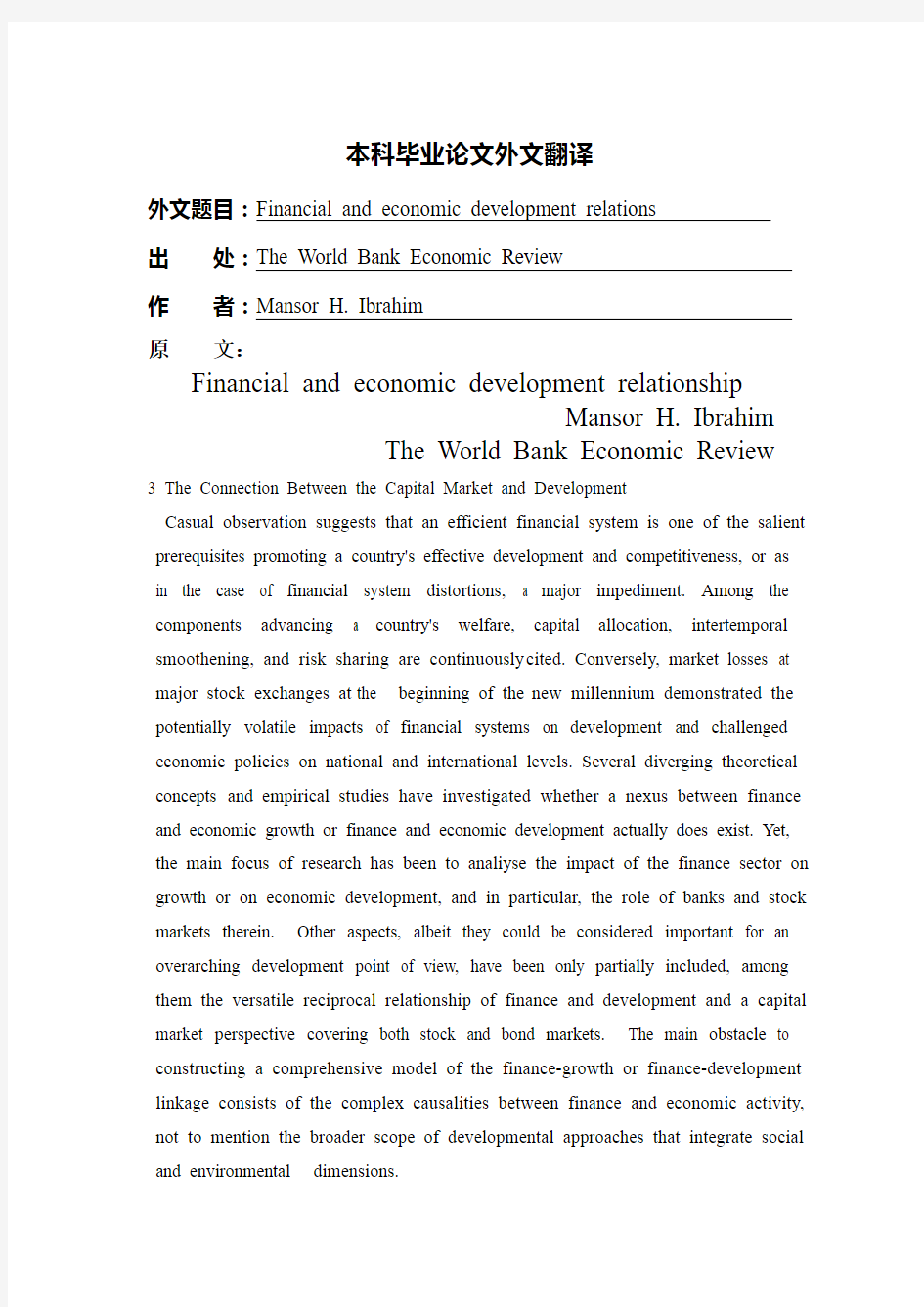外文翻译--金融业和经济发展的关系

- 1、下载文档前请自行甄别文档内容的完整性,平台不提供额外的编辑、内容补充、找答案等附加服务。
- 2、"仅部分预览"的文档,不可在线预览部分如存在完整性等问题,可反馈申请退款(可完整预览的文档不适用该条件!)。
- 3、如文档侵犯您的权益,请联系客服反馈,我们会尽快为您处理(人工客服工作时间:9:00-18:30)。
本科毕业论文外文翻译
外文题目:Financial and economic development relations
出处:The World Bank Economic Review
作者:Mansor H. Ibrahim
原文:
Financial and economic development relationship
Mansor H. Ibrahim
The World Bank Economic Review 3 The Connection Between the Capital Market and Development
Casual observation suggests that an efficient financial system is one of the salient prerequisites promoting a country's effective development and competitiveness, or as in the case of financial system distortions, a major impediment. Among the components advancing a country's welfare, capital allocation, intertemporal smoothening, and risk sharing are continuously cited. Conversely, market losses at major stock exchanges at the beginning of the new millennium demonstrated the potentially volatile impacts of financial systems on development and challenged economic policies on national and international levels. Several diverging theoretical concepts and empirical studies have investigated whether a nexus between finance and economic growth or finance and economic development actually does exist. Yet, the main focus of research has been to analiyse the impact of the finance sector on growth or on economic development, and in particular, the role of banks and stock markets therein. Other aspects, albeit they could be considered important for an overarching development point of view, have been only partially included, among them the versatile reciprocal relationship of finance and development and a capital market perspective covering both stock and bond markets. The main obstacle to constructing a comprehensive model of the finance-growth or finance-development linkage consists of the complex causalities between finance and economic activity, not to mention the broader scope of developmental approaches that integrate social and environmental dimensions.
Having these considerations in mind, this work will proceed wdth brief notes on some essential aspects which form the basis of any financial system design (Chapter 3.1) and an outline of theoretical concepts and empirical studies pertinent to the finance and economic growth or finance and economic development linkage (Chapter 3.2). Thereafter, a look at the capital market and development connection follows. China's peculiarities, above all its highly dynamic development and comparatively brief history of stock and bond markets' re-emergence, as well as the objective of this work, which goes beyond a purely economic growth perspective, require an approach other than that of utilising econometric models for financial market analysis. Thus an alternative concept, the functional perspective, is employed and combined with a look at capital market data and indicators as well as influential parameters to investigate the impact a capital market can have on development (Chapter 3.3).
3.1 General Aspects of Financial System Design
Three aspects of the financial system are discussed in the following section, as they describe ground rules which determine the capital market's role and characteristics within a financial system. Generally speaking, a financial system is defined as "... the collection of markets, institutions, laws, regulations, and techniques through which bonds, stocks, and other securities are traded, interest rates are determined, and financial services are produced and delivered around the world. This statement points to the first feature to be reviewed in this section, the relevance of the long-lasting discourse surrounding the advantages attributed to a bank-based and to a market-based financial system (Chapter 3.1.1). Similarly, there have been broad considerations regarding what constitutes an efficient financial system at all. While theoretical finance models describe fiilly competitive, fiictionless markets, reality shows that imperfections, including asymmetric information and transaction costs, are an inevitable facet of even highly developed financial systems (Chapter 3.1.2). Beyond that, the third facet considered at this point pertains to the continuous change requiring constant innovation and a long-term evolutionary perspective (Chapter 3.1.3).
